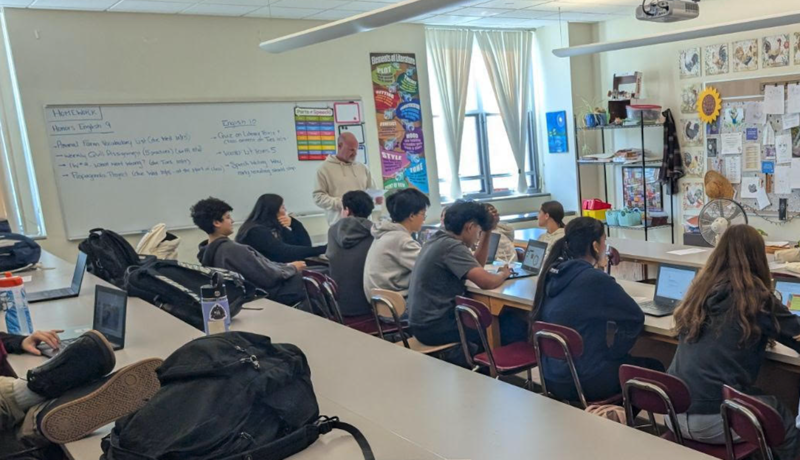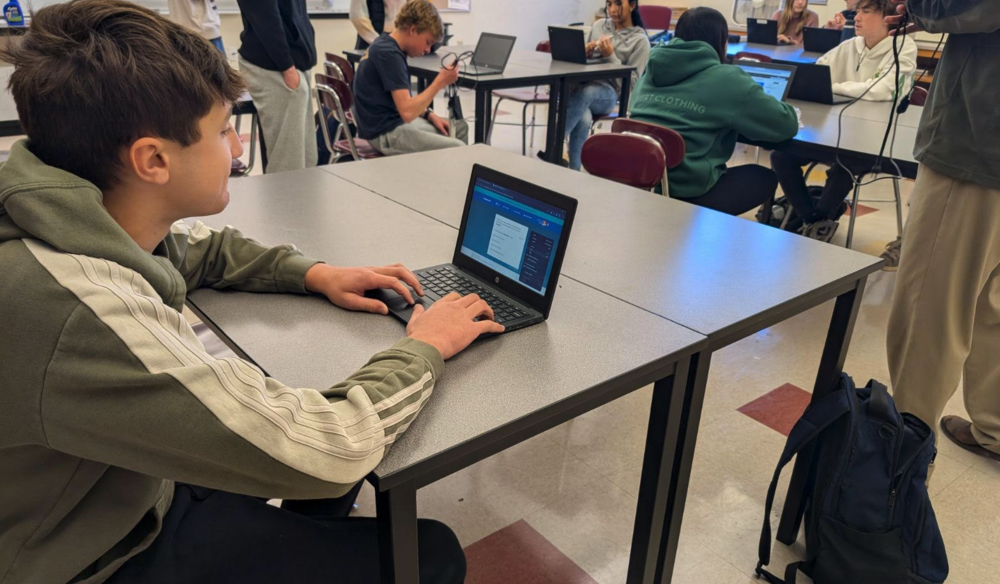This school year marks two significant milestones for Groton-Dunstable Regional High School: the second year of its no-smartphone policy and the first full year of its 1:1 Chromebook program. Together, these initiatives are creating a more focused, connected, and balanced learning environment for the school’s 650 students.
Fostering Focus and Connection
The school’s smartphone policy, fully implemented last year, restricts student use of smartphones during the school day. The goal is straightforward: help students stay present, engage deeply with their teachers and learning, and strengthen in-person connections.
Groton-Dunstable Regional High School Principal Rick Arena leads these efforts. “We have one student who realized he couldn’t help himself, so he volunteered to drop off his phone in the main office each day," noted Mr. Arena. "The no smartphone policy actually became a source of pride and a positive point of conversation.”
Teachers report fewer distractions, smoother transitions, and richer classroom discussions. Many students appreciate the clarity the policy brings. “Smartphones make effective learning nearly impossible, and GDRHS is showing real courage by addressing that reality. Consistency in enforcing our ‘Off and Away’ policy is essential to reducing distractions and improving both academics and student well-being,” said Groton-Dunstable Regional High School Assistant Principal Sean Kiley.
The policy also places Groton-Dunstable ahead of a growing statewide trend. Starting in 2026, Massachusetts will require all public schools to restrict student smartphone use to enhance learning and well-being by reducing screen time.
A National Movement Toward Limiting Smartphones
Groton-Dunstable’s approach reflects a broader shift in the education landscape. As of September 2025, 34 states and the District of Columbia have laws or policies governing the use of smartphones in schools. This year, 22 states, including Texas, Oklahoma, and Massachusetts, will enact new restrictions.
Some states have complete bans during instructional time, while others fund solutions such as secure storage systems. The shared goal is to reduce distraction, protect mental health, and foster social connection. Research indicates that removing phones can enhance comprehension, improve test performance, and promote mental well-being, while also reducing cyberbullying and classroom disruptions.
Chromebooks for Learning, Not Distraction
This school year marks the first full implementation of the 1:1 Chromebook program at the high school. Each student now has a district-issued Chromebook for daily academic use.
District Systems Administrator Joe Bisbee explained just one of the many efficiencies, sharing, “When every kid’s using the same machine, I can spend my time keeping the network running instead of figuring out why a bring-your-own-device doesn’t connect to Wi-Fi.”
The initiative extends learning beyond the classroom, enabling students to access assignments, collaborate on projects, and use digital tools responsibly. Mr. Arena added, “Our 1:1 Chromebook policy has been going well as we work toward full participation. In the meantime, we’ve been providing students with school-issued devices to ensure everyone has access to the tools they need for learning.”
“The 1:1 Chromebook program has been a powerful equalizer,” said Mr. Kiley. Continuing, “giving every student access to the same digital resources while empowering teachers to enhance learning through technology…Still, at the heart of great teaching remains our dedicated educators and not the device itself.”
Groton-Dunstable has been a Google Workspace for Education district since 2013, so students are proficient in tools such as Google Docs, Slides, and Classroom. The 1:1 model deepens this integration and ensures equal access for all.
In a lively discussion about the program, students emphasized its benefits. One student remarked, “A student on an unmanaged laptop is like a student in a candy shop…”
Balancing Technology in a Digital Age
Together, the smartphone policy and 1:1 Chromebook program reflect Groton-Dunstable’s balanced approach to technology, providing powerful tools while setting clear boundaries. Students gain access to essential digital resources while learning to stay focused, present, and respectful in shared learning spaces.
As districts nationwide explore similar strategies, Groton-Dunstable Regional High School stands as an exemplar of how intentional technology policies, rooted in research and student relationships, can enhance learning, well-being, and digital balance in the 21st-century classroom.


